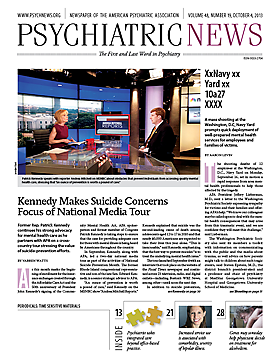When certain alternative, “externalizing” symptoms of depression that appear to be more common among men are used to assess for depression, then men are more likely to meet depression criteria, and the long-established disparities in the prevalence of depression between men and women appear to be eliminated.
This is the conclusion of researchers at the University of Michigan who performed a secondary analysis of the National Comorbidity Study Replication (NCS-R) that appeared online August 28 in JAMA Psychiatry.
Subjects in the NCS-R were a national representative sample of 10,000 men and women.
“Although men were likely to endorse many traditional depression symptoms, men were significantly more likely to report symptoms of anger attacks/aggression, irritability, substance abuse, and risk-taking behaviors over symptoms such as withdrawal from friends, sleep problems, and feelings of complaintiveness,” wrote Lisa Martin, Ph.D., of the Women’s and Gender Studies and Health Policy Studies at the University of Michigan, and colleagues in the report. “These results suggest that relying only on men’s disclosure of traditional symptoms could lead to an underdiagnosis of depression in men and that clinicians should consider other clues when assessing depression in men.”
For the purposes of the analysis, Martin and colleagues developed two scales for assessing “externalizing” symptoms endorsed by subjects in the NCS-R. The two scales they developed—the Male Symptoms Scale (MSS) and the Gender Inclusive Depression Scale (GIDS)—were derived from two other scales tested and validated in Europe (the Gotland Male Depression Scale and the Masculine Depression Scale).
To create the new scales, researchers conducted an extensive literature review to construct a list of alternative male-type depression symptoms and then compared this list against the NCS-R questionnaire and dataset to determine whether appropriate variables capturing the desired symptoms could be identified. Symptoms were excluded from the scales for one of three possible reasons: symptoms were deemed inappropriate, equivalent items were not available, or the number of people for whom data were available for a symptom was too small to be useful for the analysis
The MSS included only the alternative male-type symptoms of depression: irritability, anger attacks/aggression, sleep disturbance, alcohol/other drug abuse, risk-taking behavior, hyperactivity, stress, and loss of interest in pleasurable activities. The GIDS combined these symptoms with six traditional symptoms of depression, including sad/depressed mood, loss of vitality, tiredness, ambivalence, anxiety/uneasiness, and complaintiveness.
The researchers found that when using the MSS scale for only alternative, male-type symptoms of depression, a higher proportion of men (26.3 percent) than women (21.9 percent) met criteria for depression. Analyses using the GIDS showed that men and women met criteria for depression in almost equal proportions: 30.6 percent of men and 33.3 percent of women.
Men endorsed the following items at significantly higher rates than did women: anger attacks/aggression, substance abuse, and risk-taking behavior. Women endorsed four symptoms at significantly greater rates than men: stress, irritability, sleep problems, and loss of interest in things you usually enjoy, such as work, hobbies, and personal relationships.
“This is the first study, to our knowledge, to assess the implications of considering alternative, male-type symptoms of depression for sex differences in the prevalence of depression in a nationally representative sample of U.S. adults,” the researchers stated.
APA Director of Research Darrel Regier, M.D., M.P.H., who reviewed the report, said the assertion that the alternative “externalizing” symptoms are the equivalent of the depressive disorders requires additional validation.
“Such validators would include the kind of antecedent, concurrent, and predictive validators that were used to assess the most appropriate grouping of disorders in DSM-5,” Regier said. “The DSM-5 Task Force did not find [depression and these externalizing symptoms] to be equivalent disorders.”
He added, “The authors of this paper simply assert that these externalizing symptoms are male equivalents of depression. But there is no evidence provided that they are equivalent—only that they are more prevalent in men than they are in women. An alternative conclusion has been that men have different mental disorder prevalence rates of specific disorders than women—that is, women have higher rates of depression, and men have higher rates of substance use disorders, antisocial personality disorder, and intermittent explosive disorder. It isn’t clear why the authors believe that these latter conditions are male equivalents of depression.” ■
